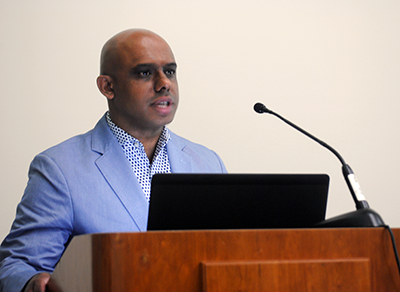Toronto Psychiatrist Brings ECHO Model to Mental Health

Project ECHO (Extension of Community Health Outcomes) is a telehealth-based initiative that brings local physicians together with specialists at an academic medical center in a hub-and-spoke model to use the power of the “collective” to improve health care.
ECHO was started in 2003 to improve hepatitis care in rural New Mexico and has since spread across the globe for a variety of disciplines. At APA’s Annual Meeting, Sanjeev Sockalingam, M.D. (pictured above), an associate professor of psychiatry at the University of Toronto, discussed the implementation of ECHO for mental health care in Ontario. His talk was part of the Rapid-Fire Talks: Focus on Technology series.
As Sockalingam described, echo ontario mental health involves weekly two-hour video teleconferences led by the hub at the University of Toronto. The hub team is interdisciplinary, featuring experts in addictions, child psychiatry, trauma, and social work. The sessions include a short didactic lecture on rotating medical topics followed by intensive case discussions (anonymized) brought forward by one of the participating local centers.
Sockalingam told the audience that his group first looked at population and hospitalization data in their region to see what conditions and regions had the most need and reached out to providers in those areas. He reported that as of today, willingness to participate has been solid. The Toronto ECHO includes 52 spoke sites ranging from 22 kilometers to 1,900 kilometers from the hub, and participants at those sites include physicians, pharmacists, nurse practitioners, social workers, and other professionals.
Participants in the program reported that the ECHO curriculum not only increased their knowledge of mental health, but also their diligence, made them collaborate more, and even changed some practice behaviors.
“What was especially important is that many people said this project reduced their social isolation, which is a big factor for burnout among rural health care providers,” Sockalingam said.
He added that there is still a lack of long-term data given that the program is just wrapping up its second year, and the first assessment did not collect any quantitative measures of behavior change, though he hopes to conduct additional evaluations.
“We are also trying to find that secret ingredient that works the best for mental health practitioners,” he added. “There are many variables in ECHO, but from a cost-effectiveness standpoint, we want to find what is driving the best outcomes.”
(Image: David Hathcox)
|
|
|
|
|


